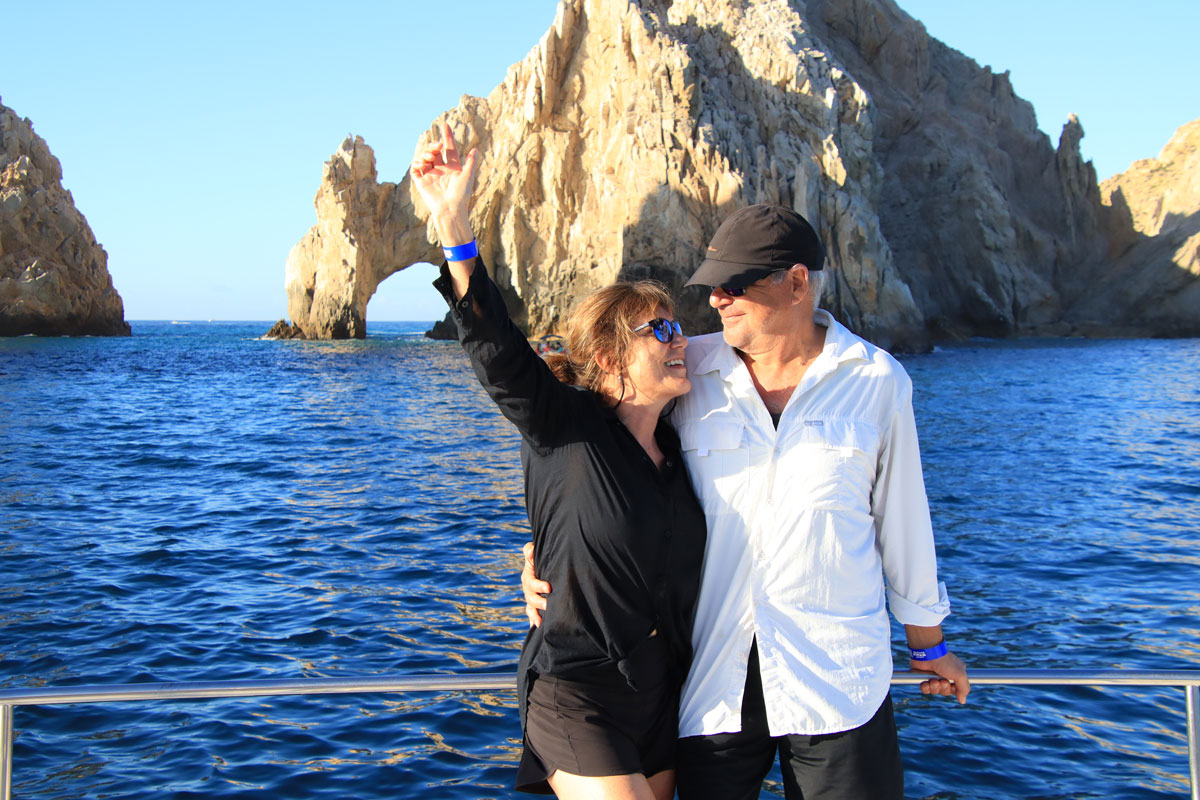Up Close With Giants: Baja Charters Whale Shark Tour Review
Snorkeling with whale sharks in La Paz, Mexico, is a unique bucket list thrill like no other. These gentle giants are the largest fish in the ocean – and being face-to-face with them is OMG surreal!
We’ve gone three times now, twice with Baja Charters on a day trip from Cabo. And this latest Baja Charters whale shark tour was easily our best yet!
Thanks to warm seas in December, the swimming was comfortable, and we lucked out with seven to nine whale sharks gliding beside us for ages.
Yes, their tour is one of the priciest from Los Cabos – but worth every peso. As a bonus, you get to cruise in beautiful Balandra Bay and snorkel with sea lions at San Rafaelito.
So, is this Baja Charters’ experience the ultimate whale shark tour from Cabo? Read on to find out why we think it just might be!

Best whale shark tour from Cabo
Splurge-worthy deluxe option (with sea lions!)
Baja Charters offers the most luxurious day trip aboard their spacious catamaran. Snorkel with whale sharks and playful sea lions (with gourmet hot meals and an open bar included).
➡️ Other excellent, less pricey tours (no sea lions)
Prefer to spend less? These 5-star-rated tours also include roundtrip transfers from your Cabo accommodation:
Contents: Review of Baja Charters’ La Paz whale shark tours
The experience with Baja Charters
Responsible whale shark tourism in La Paz
More FAQs about this tour and the whale sharks
Baja Charters’ whale shark and sea lion adventure
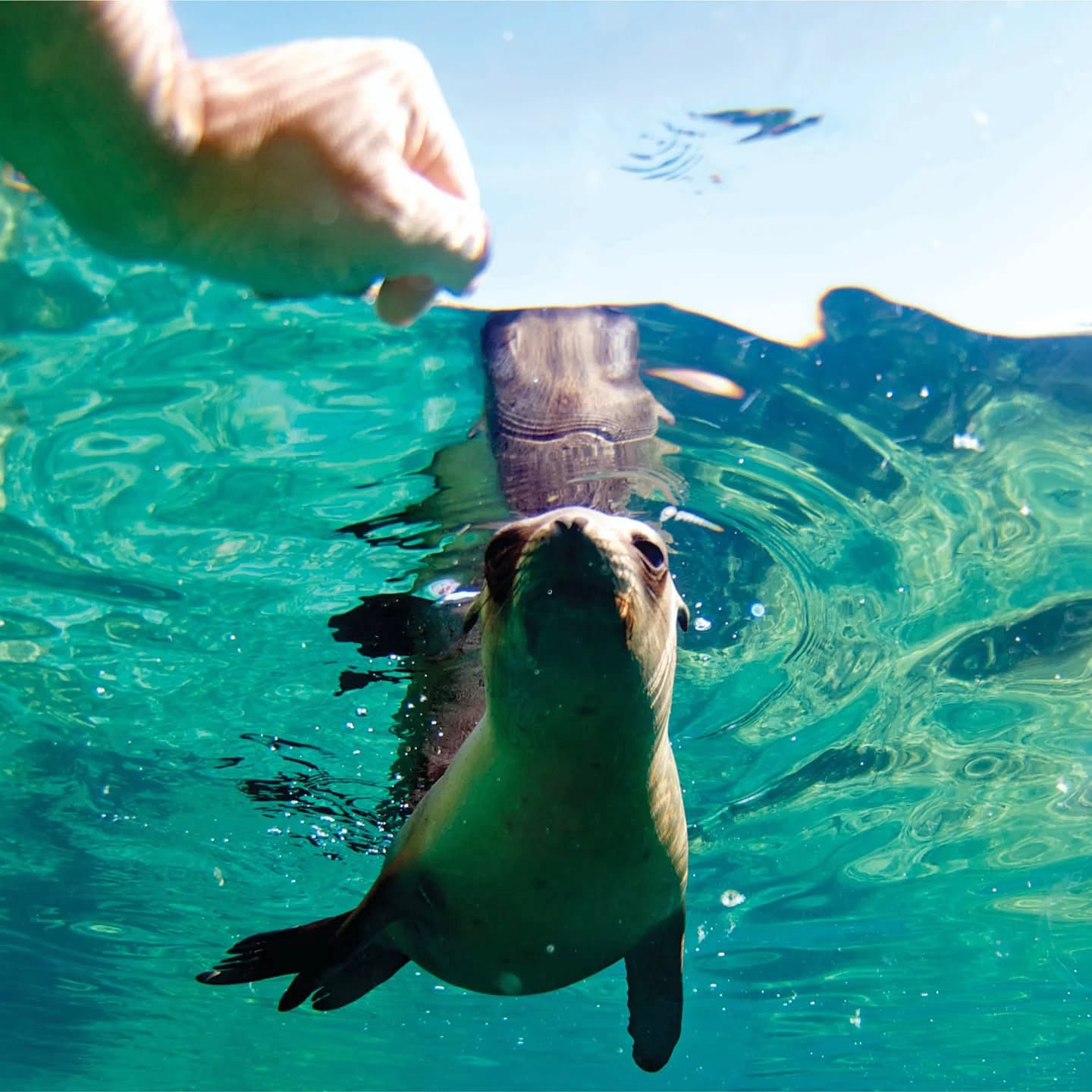
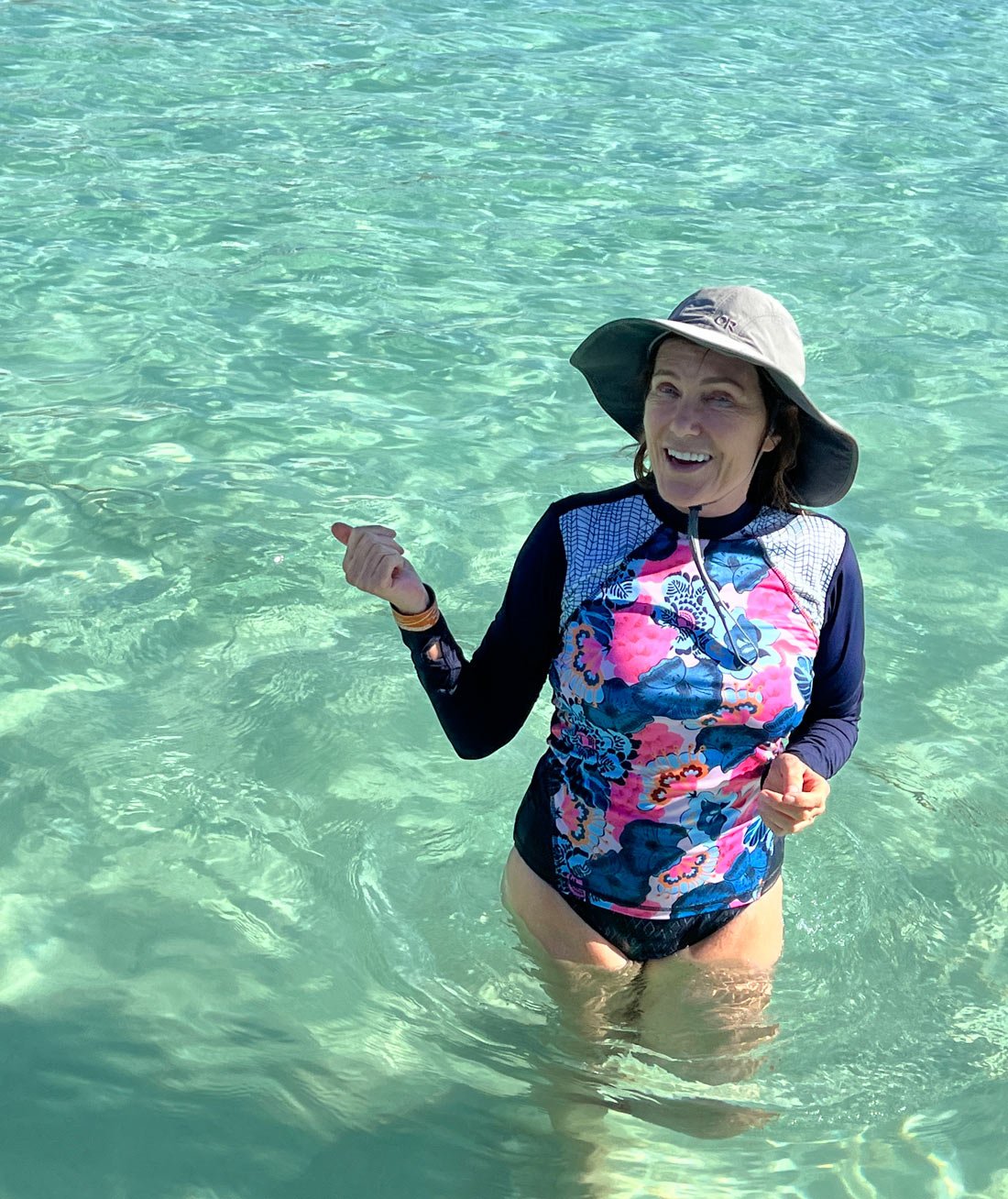
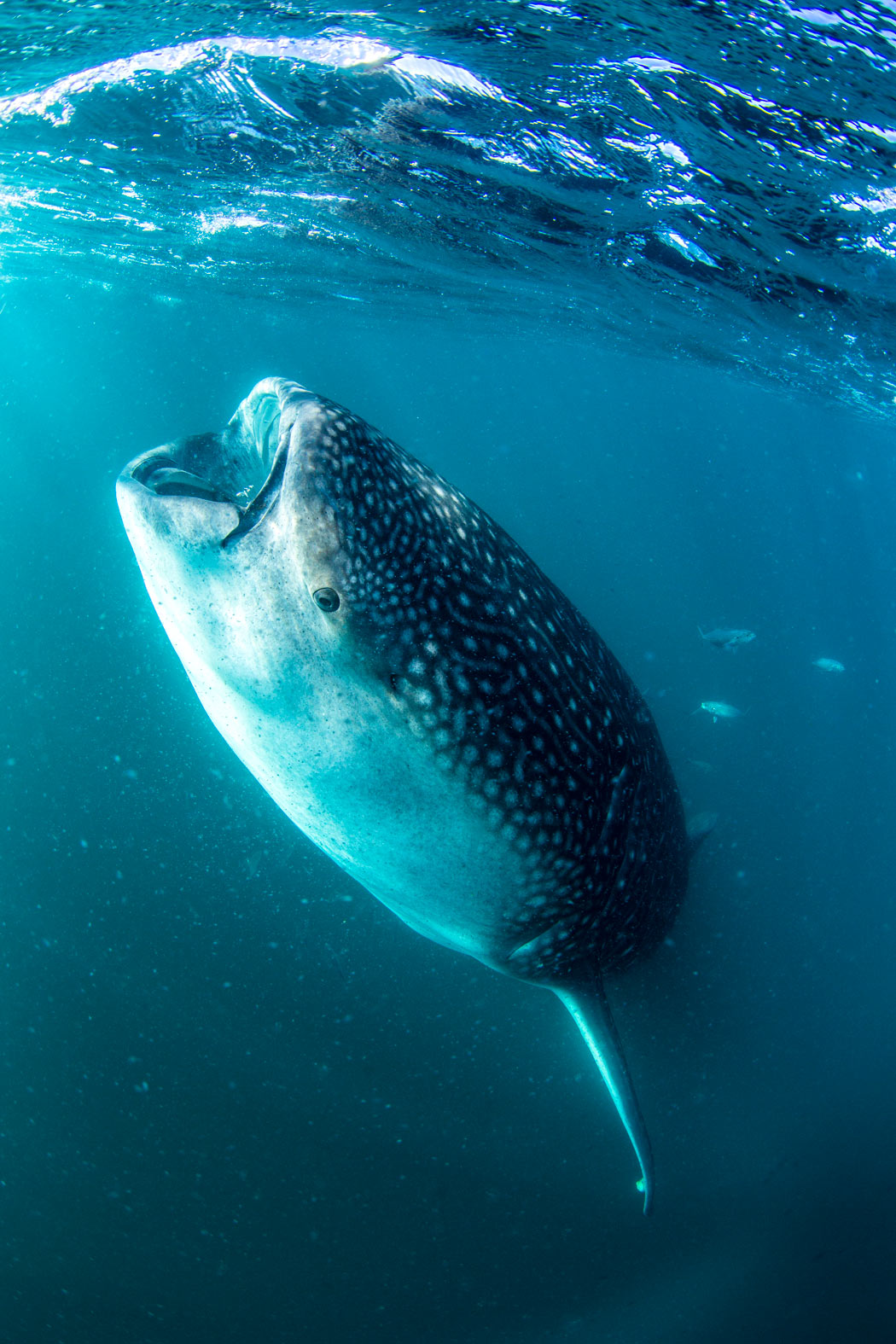
Getting to La Paz
Your day starts bright and early, with an air-conditioned van picking you up in Cabo around 6:30 am. The drive to La Paz takes about two hours.
The boat (Island Cat)
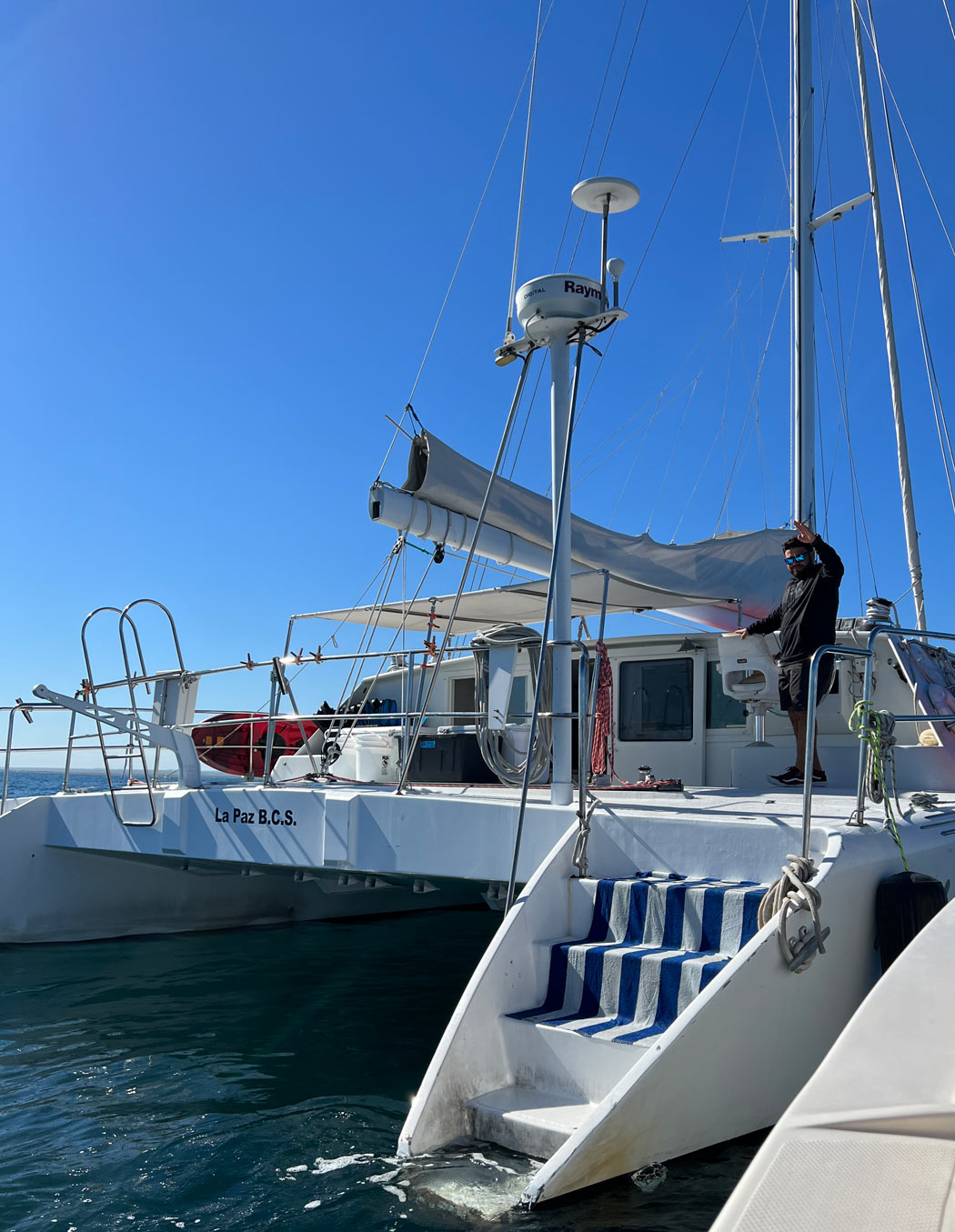
Upon arriving in La Paz, you board the Island Cat, Baja Charters’ roomy 60-foot sailing catamaran that serves as the support “mother ship” for their tours.
It’s decked out with a large galley kitchen and two full bathrooms (complete with hot water showers). Although licensed for 30 passengers, it usually hosts only six to 12 guests per whale shark tour, meaning you have loads of space to relax – whether inside the cabin or stretched out on the forward trampoline deck.
Piles of fresh blue-and-white-striped towels are available for your use.
Welcome breakfast
The hostess chef had just started whipping up breakfast when we boarded along with other guests (total nine passengers).
Fresh fruit, muffins, scrambled eggs, bacon, beans, tortillas and hot coffee were warmly welcomed by everyone!
La Paz tour check-in
After breakfast, we boarded a smaller 30-foot powerboat to check in with the La Paz authorities (their office is located onshore).
The process is done remotely by GPS, cameras and telescopes to ensure every boat follows regulations.
Our tour boat was assigned to Group 2 – meaning we were in the second group of boats allowed to enter the whale shark zone.
As we had to wait an hour before we could get going, we transferred back to the comfort of the larger Island Cat and sailed to the permitted viewing area, where whale sharks had already been spotted.
On the way, Alejandro, our guide, gave us the lowdown on whale sharks and the rules for swimming with them. Then we suited up in wetsuits, grabbed snorkel gear (all provided) and got back in the small skiff.
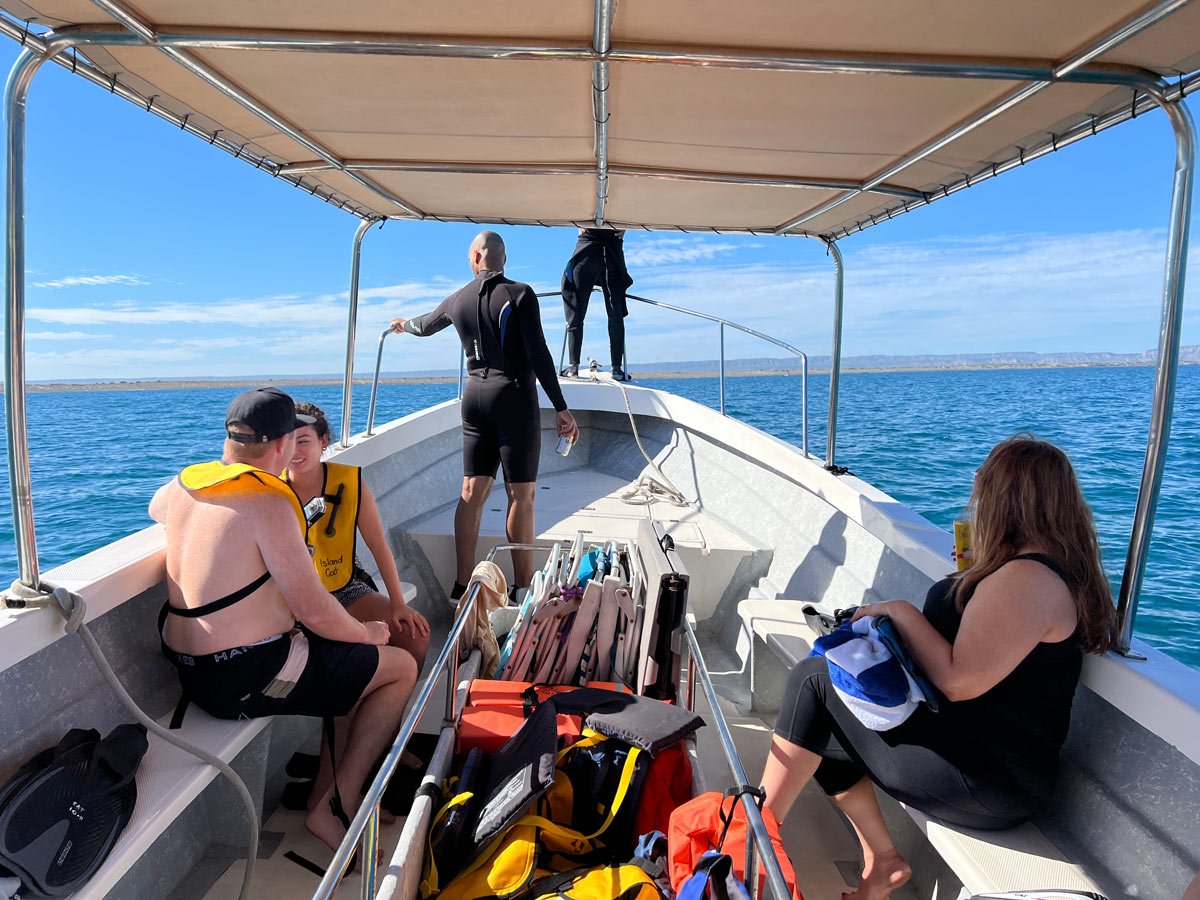
The excitement of swimming with whale sharks!
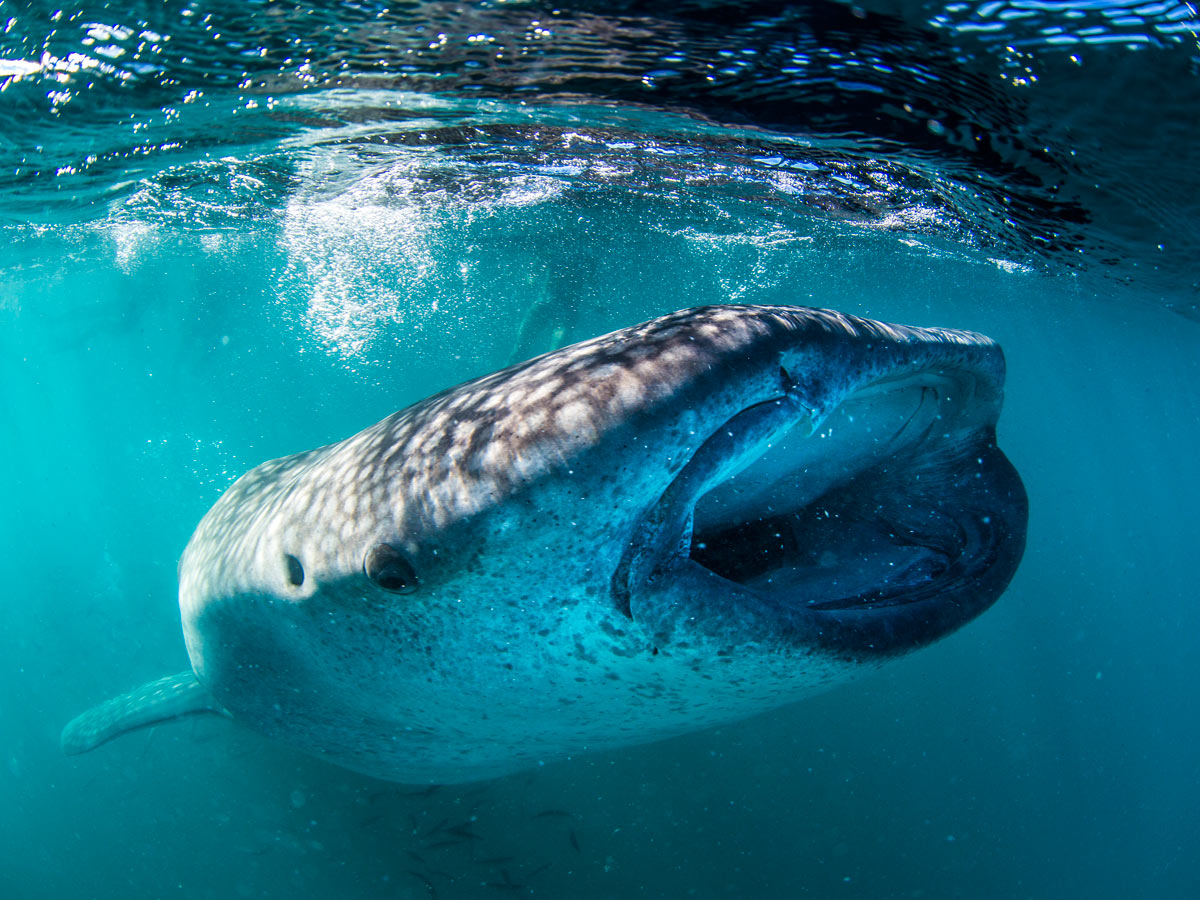
The moment we saw that first dorsal fin, we knew it was happening!
From the side of the skiff, five of us slid into the water and followed Alejandro to our first shark. What a sighting! It was probably 24 feet long, Alejandro later estimated.
The massive gray-and-black beauty, dotted with white spots, glided slowly by, about five feet away.
Visibility in the plankton-rich waters was only about 20 feet. But being so close, we got a good look at its huge gaping mouth as it opened to suction in water with plankton and krill.
The gills on the shark’s side flapped open and shut. And its enormous tail swung slowly from side to side.
Then came another shark! We had to swim a little faster, though, to keep up with this one and get a brief underwater view.
After about 15 minutes, we swam back to the boat to allow the remaining four guests their turn.
They were even luckier than we were!
From the boat, we watched three whale sharks circle our fellow guests, who barely had to move as the sharks passed within arm’s reach. Of course, we couldn’t help but be a little jealous as we heard their hoots of laughter and joy.
But then it was our turn again.
And this time, we too struck gold – several sharks in the water at once. Alejandro even let us stay in longer when others were ready to tap out.
By the end, every guest had their fill of unforgettable encounters – so much so that no one wanted to jump in for a third swim, even though offered by Alejandro.
Back on the catamaran, we showered and tucked into fresh-made guacamole, ceviche and chips.
Some of us drank wicked mezcalitas, others sipped on beer – but not too much as we still had Balandra Bay and swimming with sea lions ahead of us!

Visiting Balandra Bay

From the whale shark area, the Island Cat sailed to Balandra Bay, about 30 minutes north of La Paz, often called one of Mexico’s most beautiful spots.
What’s unique is that the crystal-clear waters here are so shallow that you can walk far out from the blindingly white beaches into the bay – and still be only waist deep in brilliant turquoise water.

We hopped into the skiff and anchored by Mushroom Rock, a two-story-high boulder sculpted by wind and waves into the shape of a mushroom.
After obligatory photos, we enjoyed just being in the warm silky water, shuffling our feet along the sandy seabed floor (the “stingray shuffle”).

Snorkeling with sea lions in La Paz

From there, we headed to San Rafaelito, a teeny rocky islet off Balandra Bay. It’s one of a couple of places in La Paz where you can snorkel with sea lions. (The other, more famous spot is Los Islotes at Espiritu Santo Island, about an hour’s boat ride away from La Paz.)
The sea lion colony at San Rafaelito numbers about 140, though you don’t see them all at one time. (It isn’t as huge as the colony at Los Islotes, said to be home to about 600 sea lions).
Slipping into the water, we snorkeled on top of the reef encircling the rocky island, careful not to stand on the coral. Sea lions as big as six feet comically sunned themselves upside down, nose out of the water, or dived and twirled around like acrobats.
They’re very curious animals, and they’d sometimes zip up close to our snorkel masks for a good peek at us.
It was playful, exhilarating and so different from the whale sharks.
Hot lunch and return to Cabo

By the time we re-boarded the catamaran (about 3:30 pm), everyone was starving. And, wow, did our hostess chef have a great lunch ready for us! Fried rib-eye steak strips, chopped steak in a creamy gravy, mashed potatoes, rice, carrots, green beans and salad awaited.
The bar was wide open, and we all ate and drank happily as we sailed back to La Paz, gushing about the day’s activities.
Docking around 5:30 pm, we met our driver and returned to Cabo by 7:30 pm – full of wonderful memories.

Responsible whale shark tourism in La Paz
Whale sharks are an endangered species, so La Paz has strict rules to protect them.
The designated whale shark viewing zone is 12 miles by 3 miles, with a nearby conservation area completely off-limits to boating and tours.
- Boat limits: No more than four groups per day (with a maximum of 14 boats in each) are permitted in the zone each day. Tours are staggered with separate check-in times, starting at 8:00 am, and they’re about two to three hours long.
- Snorkeler limits: Guests must split into smaller groups (our group of nine divided into two), taking turns in the water.
- Keep your distance: We had to keep a safe distance from the whale sharks – especially their powerful tails – and Alejandro tugged us back if we drifted too close.
- No touching: Whale sharks have a thin layer of mucus on their skin that acts as their natural shield against bacteria and parasites. Touching them can harm them.
- Sunscreen: Forget your usual sunblock. It’s believed whale sharks are sensitive to the smells and chemicals in beauty and sunscreen products. We used the boat’s scent-free and reef-safe biodegradable sunscreen.
When’s the best time to go?

The best time to snorkel with whale sharks in La Paz is from mid-October to February/March, sometimes into April, when whale sharks feed.
During the winter months, northerly winds blow down the Sea of Cortez, pushing plankton, krill and other whale shark food into the Bay of La Paz, drawing the sharks in.
For warm water and more comfortable swimming, the best time to go is October and November, when the water temperature can reach up to 80 degrees. (In contrast, the water temp drops to the low 60s in January.)
The downside to planning a whale shark trip in October is there may be fewer whale sharks – and some tours may be canceled.
We found mid-December to be the perfect sweet spot – a mix of warm water and lots of whale sharks.
More FAQs about the La Paz whale sharks and this tour
Are they whales or sharks?
Trick question! They’re sharks (Rhincodon typus) and part of the fish family, as they have gills, which allow them to breath underwater. (Unlike whales, you won’t catch them surfacing for air.)
How big are they?
Whale sharks are huge. The largest fish in the sea, they can grow up to 45 feet long (some say even 60 feet). Most in La Paz are a “modest” 18 to 25 feet – still jaw-dropping when one glides right past your mask.
Is it safe to swim with whale sharks?
Totally. They may be sharks, but they’re filter feeders, dining on plankton and krill (not people).
They move their heads back and forth in the water to let these microorganisms flow into their huge mouths and through filtering pads at the entrance to their throats. It’s fascinating to watch!
When is the sea lion season in La Paz?
You can swim with sea lions in La Paz from mid-October to the end of May.
It’s prohibited in June, July and August (the breeding season) to protect breeding females and pups. The males can also be aggressive during this time.
What’s included in your Baja Charters whale shark tour
Baja Charters packs in plenty of perks to make the day feel more like a mini luxury cruise. Here’s what their whale shark tours include:
- Roundtrip transportation from Los Cabos
- The Island Cat catamaran – comfy, with two full bathrooms (and, yes, hot fresh-water showers!) plus lots of room to lounge
- A freshly-made hot breakfast and lunch, plus mid-morning snacks
- An open bar with premium drinks, plus water and soft drinks
- The use of clean towels
- Wetsuits and snorkeling gear
- Multiple swims with the whale sharks – at least three separate jumps from the skiff
- A visit to Balandra Bay
- Swimming with sea lions at San Rafaelito
- Lots of crew to serve you
Final thoughts
Swimming with whale sharks in La Paz is one of those adventures that sticks with you forever. Add in Balandra Bay’s turquoise waters, playful sea lions at San Rafaelito and the comfort of Baja Charters’ Island Cat – and you’ve got an unforgettable full-day tour that’s worth every penny.
More adventurous things to do in Cabo
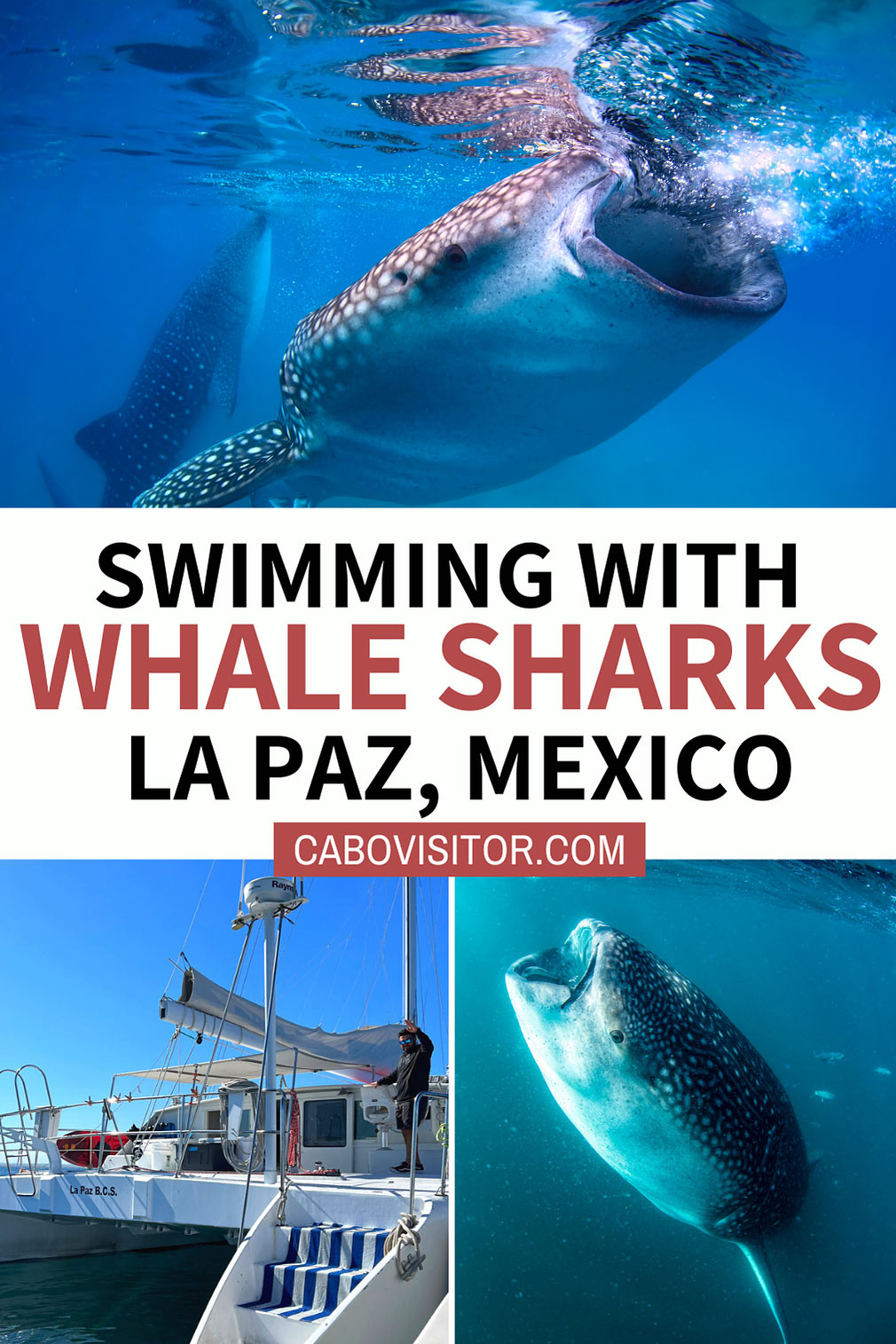
Disclosure: Our La Paz whale shark swimming experience with Baja Charters was complimentary for review purposes. However, as professional travel journalists, we always retain full editorial control over our thoughts and words – and we let you in on both the “good” and the “bad” about our trips and travel experiences.
Our favorite resources for planning a trip to Cabo
Resorts: Booking.com is great for scoring a “wow” hotel in Cabo – or at least a decent one. (We especially like their flexible cancellation policy!) Expedia is also worth checking for discounted hotel rates in Cabo.
Vacation homes, condos and rentals: We prefer and use Vrbo (Vacation Rentals by Owner).
Tours: For the best local guided tours in Cabo, see Viator and GetYourGuide.
Car rental: Renting a car in Los Cabos is one of the best ways to explore. Discover Cars searches car rental companies so you get the best rates.
Travel insurance: SafetyWing is designed for frequent travelers, long-term adventurers and digital nomads. It covers medical expenses, lost checked luggage, trip interruption and more. We also have and recommend Medjet for global air medical transportation and travel security.
Need more help?
- See our Start here page. It lists everything we’ve written on Cabo.
- Also check our ultimate Cabo travel guide and our article on Planning your Cabo vacation: What you should know.
Pssst! If you make a booking or purchase through our site, we may earn a small commission (at no cost to you). Thanks!
About the authors
